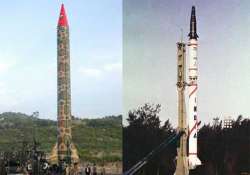India, Pak came close to nuclear confrontation 5 times, says Pak scientist Hoodbhoy
London, Feb 1 : India and Pakistan came dangerously close to nuclear confrontation on at least five occasions in the past 20 years, according to a visiting Pakistani nuclear physicist, defence analyst and editor of

London, Feb 1 : India and Pakistan came dangerously close to nuclear confrontation on at least five occasions in the past 20 years, according to a visiting Pakistani nuclear physicist, defence analyst and editor of a new book “Confronting the Bomb: Indian and Pakistani Scientists Speak Out.”
In an interview to The Tribune's Shyam Bhatia, Prof Hoodbhoy said the most serious confrontation was at the time of the 1999 Kargil war.
Hoodbhoy said: “According to Bruce Ridel, former Special Adviser to the US President who was present when President Bill Clinton met Nawaz Sharif in the White House, Nawaz replied in the negative when Clinton asked him if he knew what his army was doing.”
Hoodbhoy said the first of the nuclear dramas started more than a decade earlier - during Operation Brass Tacks in 1987 - just when Pakistan acquired the bomb and sent a message to India: Don't get closer.
“General Sundarji was in charge on the Indian side. He was a man who was gung ho about putting Pakistan in its right place. Here was a man who was terribly in love with nuclear weapons and used to say India doesn't need more than five nuclear weapons - for Karachi, Quetta, Lahore, Peshawar and Islamabad.”
Hoodbhoy said when tensions peaked over Kashmir in 1990 and there was an exodus of Kashmiri refugees into Pakistan, Islamabad again moved its nuclear weapons from Kahuta to the Chaklala air force base on to F16s.
“That's when the Americans are said to have known about it and conveyed a message to the Indians to back off.”
In 2002, soon after the attack on India's Parliament by Jaish-e-Mohammed, New Delhi invoked Operation Parakaram to “stare down” Pakistan. “Pakistan warned India by saying, “We've got nukes.”
Had India crossed the international border, it would have been confronted by a nuclear holocaust. Of course, Pakistan would have had to face one too.
“In 2008 at the time of the attacks in Mumbai, there were voices that said that it was the time to ready nuclear weapons. I was in a TV studio with General Hamid Nawaz.
“When the anchor asked what should be done if India attacked, General Nawaz replied: Let's nuke them before they get too close to us.”
In an interview to The Tribune's Shyam Bhatia, Prof Hoodbhoy said the most serious confrontation was at the time of the 1999 Kargil war.
Hoodbhoy said: “According to Bruce Ridel, former Special Adviser to the US President who was present when President Bill Clinton met Nawaz Sharif in the White House, Nawaz replied in the negative when Clinton asked him if he knew what his army was doing.”
Hoodbhoy said the first of the nuclear dramas started more than a decade earlier - during Operation Brass Tacks in 1987 - just when Pakistan acquired the bomb and sent a message to India: Don't get closer.
“General Sundarji was in charge on the Indian side. He was a man who was gung ho about putting Pakistan in its right place. Here was a man who was terribly in love with nuclear weapons and used to say India doesn't need more than five nuclear weapons - for Karachi, Quetta, Lahore, Peshawar and Islamabad.”
Hoodbhoy said when tensions peaked over Kashmir in 1990 and there was an exodus of Kashmiri refugees into Pakistan, Islamabad again moved its nuclear weapons from Kahuta to the Chaklala air force base on to F16s.
“That's when the Americans are said to have known about it and conveyed a message to the Indians to back off.”
In 2002, soon after the attack on India's Parliament by Jaish-e-Mohammed, New Delhi invoked Operation Parakaram to “stare down” Pakistan. “Pakistan warned India by saying, “We've got nukes.”
Had India crossed the international border, it would have been confronted by a nuclear holocaust. Of course, Pakistan would have had to face one too.
“In 2008 at the time of the attacks in Mumbai, there were voices that said that it was the time to ready nuclear weapons. I was in a TV studio with General Hamid Nawaz.
“When the anchor asked what should be done if India attacked, General Nawaz replied: Let's nuke them before they get too close to us.”